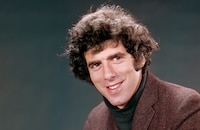The Lady Vanishes
Brief Synopsis
Cast & Crew
Anthony Page
Elliott Gould
Cybill Shepherd
Angela Lansbury
Herbert Lom
Arthur Lowe
Film Details
Technical Specs
Synopsis
On an express train travelling through pre-World War II Germany, American heiress Amanda Kelly (Cybill Shepherd) befriends a cute old nanny, Miss Froy (Angela Lansbury). But when Miss Froy disappears, everyone Amanda questions denies having ever seen her. Eventually Amanda persuades American photographer Robert Condon (Elliot Gould) to help her search the train, during which they discover that Miss Froy wasn't quite what she seemed.
Director
Anthony Page
Cast

Elliott Gould

Cybill Shepherd

Angela Lansbury

Herbert Lom
Arthur Lowe
Ian Carmichael
Gerald Harper
Jean Anderson
Jenny Runacre
Vladek Sheybal
Madlena Nedeva
Wolf Kahler
Madge Ryan
Rosalind Knight
Jonathan Hackett
Barbara Markham
Garry Mcdermott
Jacki Harding
John Alkin
Jeremy Bulloch
William Hootkins
Jillianne Foot
Helen Lambert
Claus-dieter Reents

Dan Van Husen
Pierre Frankh
Uli Steigberg
Edgar Wenzel
Heinz Winter
Bruno Thost
Claus Fuchs
Peter Schratt
Crew
Bill Alexander
George Axelrod
Ken Barker
Peter Brayham
Peter Callander
Jill Carpenter
Michael Carreras
Alfred Cox
Michael Dryhurst
Allan Foenander
Sidney Gilliat
Nick Gillott
Richard Graydon
Martin Gutteridge
Peter Handford
Donald Hansard
John Harris
Richard Hartley
Christian Jungbluth
Stephanie Kaye
Irene Lamb
Frank Launder
Russell Lloyd
Bernard Lodge
Philip Martell
Michael Mertineit
Andrew Montgomery
Emma Porteous
Kay Rawlings
Les Reed
Tom Sachs
Albert Schwinges
Arlene Sellers
Sally Shewring
Wilfred Shingleton
Douglas Slocombe
Neville Smallwood
Dusty Symonds
Georg Von Kieseritzky
Paul Weston
Ethel Lina White
Alex Winitsky
Film Details
Technical Specs
Articles
George Axelrod, 1922-2003
Born June 9, 1922, in New York City to the son of the silent film actress Betty Carpenter, he had an eventful childhood in New York where, despite little formal education, he became an avaricious reader who hung around Broadway theaters. During World War II he served in the Army Signal Corps, then returned to New York, where in the late 40's and early 50's he wrote for radio and television and published a critically praised novel, Beggar's Choice.
He scored big on Broadway in 1952 with The Seven Year Itch. The comedy, about a frustrated, middle-aged man who takes advantage of his family's absence over a sweltering New York summer to have an affair with a sexy neighbor, won a Tony Award for its star, Tom Ewell, and was considered daring for its time as it teased current sexual mores and conventions. The play was adapted into a movie in 1955 by Billy Wilder, as a vehicle for Marilyn Monroe, with Ewell reprising his role. Unfortunately, the censors and studio executives would not allow the hero to actually consummate the affair; instead, Ewell was seen merely daydreaming a few romantic scenes, a situation that left the playwright far from happy.
Nevertheless, the success of The Seven Year Itch, opened the door for Axelrod as a screenwriter. He did a fine adaptation of William Inge's play Bus Stop (1956) again starring Marilyn Monroe, and did a splendid job transferring Truman Capote's lovely Breakfast at Tiffany's (1961). Although his relationship with the director Blake Edwards was rancorous at best, it did earn Axelrod his only Academy Award nomination.
So frustrated with his work being so heavily revised by Hollywood, that Axelrod decided to move from New York to Los Angeles, where he could more closely monitor the treatment of his scripts. It was around this period that Axelrod developed some his best work since he began producing as well as writing: the incisive, scorchingly subversive cold war thriller The Manchurian Candidate (1962), based on Richard Condon's novel about an American POW (Laurence Harvey) who returns home and is brainwashed to kill a powerful politician; the urbane comedy Paris When it Sizzles (1964) that showed off its stars William Holden and Audrey Hepburn at their sophisticated best; his directorial debut with the remarkable (if somewhat undisciplined) satire Lord Love a Duck (1966) that skewers many sacred institutions of American culture (marriage, school, wealth, stardom) and has since become a cult favorite for midnight movie lovers; and finally (his only other directorial effort) a gentle comedy of wish fulfillment The Secret Life of an American Wife (1968) that gave Walter Matthau one of his most sympathetic roles.
By the '70s, Axelrod retired quietly in Los Angeles. He returned to write one fine screenplay, John Mackenzie's slick political thriller The Fourth Protocol (1987) starring Michael Caine. He is survived by his sons Peter, Steven, and Jonathan; a daughter Nina; seven grandchildren; and a sister, Connie Burdick.
by Michael T. Toole

George Axelrod, 1922-2003
Quotes
Trivia
Though Cybill Shepherd only wears one costume in the movie, (a bias-cut white satin dress), the costume department made nine identical copies to facilitate filming.
Miscellaneous Notes
Released in United States 1979
Remake of "The Lady Vanishes" (1938) directed by Alfred Hitchcock.
Released in United States 1979













